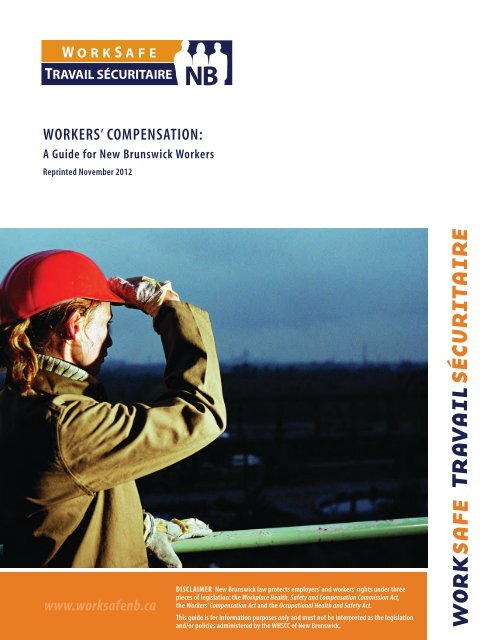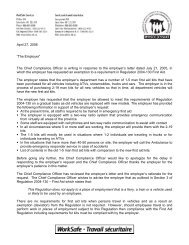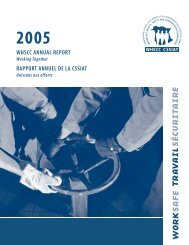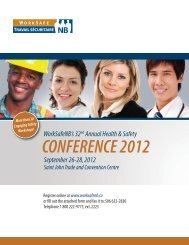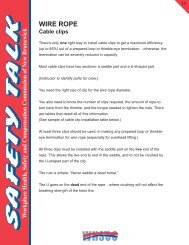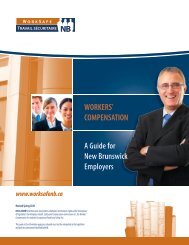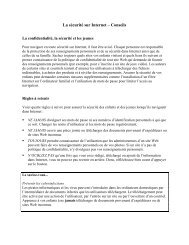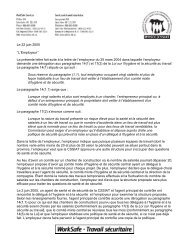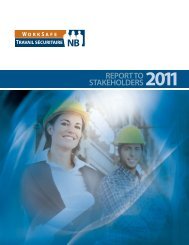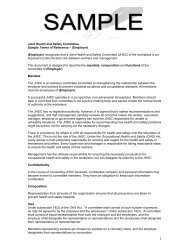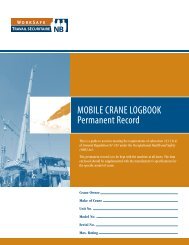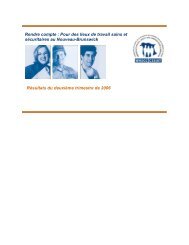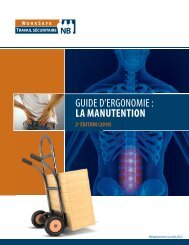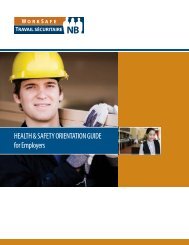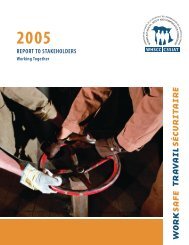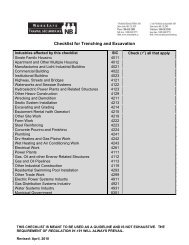Workers - WorkSafeNB
Workers - WorkSafeNB
Workers - WorkSafeNB
Create successful ePaper yourself
Turn your PDF publications into a flip-book with our unique Google optimized e-Paper software.
Reprinted November 2012<br />
www.worksafenb.ca
our vision<br />
Healthy and safe workplaces<br />
in New Brunswick.<br />
mission The Commission will promote a safe and healthy work environment to the workers and employers of<br />
New Brunswick, and efficiently provide quality services, just adjudication and fair administration of the legislation.<br />
mandate Promote the creation of a workplace culture in which all employers and workers view all occupational<br />
diseases and accidents as being preventable. • Provide sustainable insurance and insurance-related services to<br />
the employer community. • Provide timely compensation benefits, including rehabilitation, medical aid, vocational counseling<br />
and safe return-to-work services to injured workers. • Provide recommendations and advice to government with<br />
respect to legislation and publish such reports, studies and recommendations, as the Commission considers advisable.<br />
values We dedicate ourselves to the provision of prompt, effective, efficient and caring services to each of our<br />
clients. • We believe that a team approach ensures that all members of the Commission are working towards a shared<br />
vision, mission, values and goals. • We are committed to providing competent and energetic leadership that is focused<br />
on a clear direction for the Commission. • We ensure that our decisions are made with integrity, credibility, and accountability.<br />
• We ensure that our communications are based on trust, mutual respect, openness, and clear and reliable information.<br />
• We manage our human, material and financial resources effectively in responding to our mandate and<br />
established priorities.<br />
Health and Safety Emergencies: 1 800 222-9775<br />
www.worksafenb.ca<br />
Office Locations and Fax Numbers<br />
Toll free number for all locations: 1 800 222-9775<br />
Saint John<br />
Mailing address for all WHSCC offices:<br />
1 Portland Street, PO Box 160<br />
Saint John NB E2L 3X9<br />
Contact numbers for:<br />
Head Office<br />
Assessment Services<br />
Claims Inquiry<br />
Phone 506 632-2200<br />
Toll free fax for claims:<br />
1 888 629-4722<br />
Appeals Tribunal<br />
Phone 506 632-2200<br />
Fax 506 633-3989<br />
Grand Falls<br />
166 Broadway Blvd. , Suite 300<br />
Phone 506 475-2550<br />
Fax 506 475-2568<br />
Dieppe<br />
30 Englehart Street, Suite F*<br />
Phone 506 867-0525<br />
Fax 506 859-6911<br />
*As of October 2006<br />
Bathurst<br />
Place Bathurst Mall<br />
1300 St. Peter Avenue, Suite 220<br />
Phone 506 547-7300<br />
Fax 506 547-7311 or 506 547-2982<br />
<strong>Workers</strong>’ Rehabilitation Centre<br />
3700 Westfield Road<br />
Grand Bay-Westfield<br />
Phone 506 738-8411<br />
Fax 506 738-3470
PAGE 4<br />
PAGE 7<br />
PAGE 8<br />
WHAT IS THE WHSCC?<br />
• What is the workers’ compensation system?<br />
• How does it work?<br />
GUIDING PRINCIPLES OF WORKERS’<br />
COMPENSATION<br />
ROLES AND RESPONSIBILITIES<br />
HOW DOES A WORKERS’<br />
COMPENSATION CLAIM GET<br />
STARTED?<br />
COVERAGE AND REPORTING<br />
OF ACCIDENTS<br />
• What is workers’ compensation?<br />
• Who pays for workers’ compensation?<br />
• What is an accident?<br />
• What is an occupational disease?<br />
• What does the term compensation mean?<br />
• How do I know if I am covered by the<br />
<strong>Workers</strong>’ Compensation Act?<br />
• How long do I have to apply?<br />
• Do I have to work full time to be covered?<br />
• What if I am a volunteer firefighter?<br />
PAGE 13<br />
• Am I covered while employed outside of<br />
New Brunswick?<br />
• What if I am injured while working outside<br />
of New Brunswick?<br />
• What about my health insurance at work?<br />
• Can I receive other income while on workers’<br />
compensation benefits?<br />
• Will I receive compensation benefits if the<br />
injury was my fault?<br />
• If I am covered by workers’ compensation<br />
insurance, can I sue the person or company<br />
responsible for my injury?<br />
• What if my accident involved a third party?<br />
• Can my employer and I agree not to report<br />
my injury to the Commission?<br />
• What if I have a pre-existing medical<br />
condition?<br />
• What if I have a recurrence of an old<br />
work-related injury?<br />
• Could my compensation claim be<br />
investigated?<br />
• Can I get information from my claim file?<br />
IF YOU ARE INJURED AT WORK<br />
• What should I do if I am injured on the job?<br />
• What types of injuries should I report to file<br />
a claim?<br />
• Are there any conditions or situations that<br />
may affect my coverage?<br />
• Am I covered when travelling to and<br />
from work?<br />
• What if I am injured on my employer’s<br />
property?<br />
• What should my employer do?<br />
• What kind of information should be included<br />
in the accident report?<br />
• What should my physician or other health<br />
table<br />
care<br />
of<br />
provider do?<br />
contents<br />
• What happens after I file a claim?<br />
1
[table of contents]<br />
PAGE 15<br />
PAGE 17<br />
ROLES AND RESPONSIBILITIES<br />
AFTER FILING A CLAIM<br />
• What are my responsibilities after I file<br />
a claim?<br />
• What are my employer’s responsibilities<br />
when I am injured?<br />
• What are my health care providers’<br />
responsibilities?<br />
• What are the Commission’s responsibilities?<br />
COMPENSATION BENEFITS<br />
• What types of benefits can I get?<br />
• How are my Loss of Earnings benefits<br />
calculated?<br />
• What is the waiting period for benefits?<br />
• Is there a limit on insurable earnings?<br />
• What is the NBIAE?<br />
• Are workers’ compensation benefits taxable?<br />
• Can employers top up Loss of Earnings<br />
benefits?<br />
• What if I have two or more jobs?<br />
• Do I have to report receipt of employmentrelated<br />
income while on compensation?<br />
• Is there a maximum age for receiving<br />
benefits?<br />
• What about Canada Pension Plan<br />
Disability benefits?<br />
• What about entitlement to Long-term<br />
Disability benefits?<br />
• What are estimated capable earnings?<br />
PAGE 25<br />
• What is a suitable occupation?<br />
• What happens if my actual earnings exceed<br />
my estimated capable earnings?<br />
• When are Long-term Disability<br />
benefits terminated?<br />
• What about medical treatment and<br />
expenses?<br />
• What about travel expenses?<br />
• What is a Personal Care allowance?<br />
• Is there a pension at age 65?<br />
• What is a Permanent Physical Impairment<br />
award?<br />
• Does the Commission pay for burial expenses<br />
if I suffer fatal injuries?<br />
• Are there benefits for my surviving spouse<br />
and dependants?<br />
• Are my children from a previous relationship<br />
eligible for benefits?<br />
• Are benefits terminated upon remarriage?<br />
CASE MANAGEMENT<br />
• What is case management?<br />
• Who are the members of my case<br />
management team?<br />
• What are my case manager’s responsibilities?<br />
• What does an occupational therapist do?<br />
• What does a medical advisor do?<br />
• What is the rehabilitation specialist’s role?<br />
2
[table of contents]<br />
PAGE 26<br />
PAGE 30<br />
RETURN TO WORK<br />
• What are the benefits of returning to work?<br />
• Who decides when I should return to work?<br />
• What happens if I can’t return to the job I<br />
had before my injury /illness?<br />
• Does my employer have to give me a job<br />
when I am ready to return to work?<br />
• Will the Commission find me a job?<br />
• What happens if I am considered medically<br />
fit to return to the same type of job I had<br />
when I was hurt, but I cannot find work?<br />
• What happens if I am considered medically<br />
fit to return to work, but I choose not to?<br />
Do I continue to receive benefits?<br />
• Can my employer lay me off after a<br />
workplace accident?<br />
WORKERS’ REHABILITATION CENTRE<br />
• What is the <strong>Workers</strong>’ Rehabilitation Centre<br />
(WRC)?<br />
• Where do I stay?<br />
• What about meals?<br />
• What if I am admitted to the WRC?<br />
PAGE 31<br />
PAGE 34<br />
QUESTIONING A DECISION<br />
• What if I disagree with a decision on<br />
my claim?<br />
• Is there a time limit for appeals?<br />
• What is the Appeals Tribunal?<br />
• How do I submit an appeal?<br />
• What is an Appeals Panel hearing?<br />
• Can I bring a witness to my appeal?<br />
• What about new documents or reports?<br />
• Is there someone who can help me with<br />
my appeal?<br />
• What happens after an Appeals Panel<br />
hearing?<br />
• Can my employer appeal a decision on<br />
my claim?<br />
• Can I go to court?<br />
WORKERS’ ADVOCATES<br />
• What do workers’ advocates do?<br />
• Is there a fee for their service?<br />
• How can a workers’ advocate help me?<br />
• How do I access a workers’ advocate?<br />
• Contact information<br />
3
What is the WHSCC?<br />
WHAT IS THE WHSCC?<br />
The Workplace Health, Safety and Compensation<br />
Commission (WHSCC) is dedicated to promoting<br />
a safe and healthy work environment and providing<br />
services to employers and workers in<br />
New Brunswick.<br />
The Commission is an employer-funded Crown<br />
Corporation, and not a provincial government<br />
department. The Commission reports to the<br />
New Brunswick Legislature through the Minister<br />
of Post-Secondary Education and Training, and<br />
provides cost-effective disability and liability<br />
insurance for approximately 13,000 employers<br />
and 350,000 workers in New Brunswick.<br />
The Commission administers three acts:<br />
(1) the Occupational Health and Safety (OHS)<br />
Act and regulations;<br />
(2) the <strong>Workers</strong>’ Compensation (WC) Act and<br />
regulations; and<br />
(3) the Workplace Health, Safety and<br />
Compensation Commission (WHSCC) Act.<br />
The OHS Act asserts that every worker is entitled<br />
to a safe and healthy workplace. This Act places<br />
primary responsibility for occupational health<br />
and safety in the hands of workers and employers<br />
and grants workers three basic rights:<br />
• The right to know about workplace hazards;<br />
• The right to participate in solving health and<br />
safety problems; and<br />
• The right to refuse dangerous work.<br />
Note: The OHS Act also sets out specific accident<br />
reporting requirements, and defines the rights<br />
and responsibilities of employers and workers.<br />
For more information on your rights and<br />
responsibilities under the OHS Act, please<br />
contact us at 1 800 222-9775, or visit our<br />
website www.worksafenb.ca.<br />
This guide primarily addresses the legislative<br />
requirements of the WC Act.<br />
What is the workers’ compensation system?<br />
Like other pieces of workers’ compensation<br />
legislation in Canada, the WC Act of New<br />
Brunswick is based on the Meredith Principles,<br />
which formed the basis of an historic agreement<br />
between labour and business. According<br />
to the Meredith Principles, employers agreed to<br />
fund a workers’ compensation system, and in<br />
exchange, workers gave up the right to sue<br />
employers for compensation of work-related<br />
injuries.<br />
In New Brunswick, workers’ compensation is<br />
administered through a no-fault insurance system<br />
set up under the WC Act. The workers’ compensation<br />
program protects employers and<br />
workers against the impact of work injuries by<br />
compensating injured workers for lost income,<br />
health care, and other costs. It also protects<br />
employers from being sued by workers who<br />
are injured on the job.<br />
How does it work?<br />
In New Brunswick, the WC Act requires all<br />
employers with three or more part-time or fulltime<br />
employees at any time during the year to<br />
register for coverage with the Commission.<br />
Employers are grouped according to industry<br />
and associated risk, and are assessed an annual<br />
payment based on their rate group and yearly<br />
payroll.<br />
Employers are not permitted to collect compensation<br />
contributions from workers.<br />
4
[what is the WHSCC?]<br />
GUIDING PRINCIPLES OF WORKERS’ COMPENSATION<br />
No-fault compensation <strong>Workers</strong> are eligible to receive benefits for<br />
work-related injuries or occupational diseases, no matter who is at fault.<br />
Collective liability All employers in covered industries share responsibility<br />
for fully funding the cost of workers’ compensation insurance.<br />
Immunity from suit Participating employers and their workers have<br />
universal immunity against lawsuits for work-related accidents.<br />
Exclusive judicial jurisdiction The WC Act gives the Commission exclusive<br />
legal authority to make all decisions arising under the WC Act, recognizing<br />
the rules of natural justice.<br />
Fair compensation and fair premiums Compensation should be fair and<br />
should account for the nature of the injury as well as the impact<br />
on employment earnings. Furthermore, premiums should be fair and<br />
competitive and account for the full cost of the system including<br />
claims, reserves, and administration.<br />
<strong>Workers</strong>’ compensation in New Brunswick is guided by<br />
principles formulated by the former Chief Justice of Ontario,<br />
Sir William Meredith, more than 80 years ago.<br />
Comprehensive injury prevention and disability management<br />
The Commission administers the OHS Act and associated regulations.<br />
The Commission provides a comprehensive range of services to both<br />
prevent injuries and manage disabilities.<br />
Sustainability The system is operated to ensure its long-term stability,<br />
financial security, and cost-effectiveness.<br />
5
[what is the WHSCC?]<br />
ROLES AND RESPONSIBILITIES<br />
The Commission’s responsibility is to provide<br />
high quality workers’ compensation and related<br />
services to employers and injured workers.<br />
Employers, workers and health care providers<br />
are also responsible for supporting the workers’<br />
compensation system.<br />
The Commission must:<br />
• Provide injured workers with clear information<br />
in a timely manner.<br />
• Provide injured workers with effective<br />
compensation and rehabilitation services to<br />
help them return to employment.<br />
• Collaborate with workers, employers and<br />
labour organizations to promote injury prevention<br />
and develop effective disability management<br />
services.<br />
• Maintain sound financial and administrative<br />
management practices.<br />
Employers are responsible for paying<br />
assessment premiums, reporting injuries and<br />
helping injured workers return to work by<br />
offering modified or alternative employment.<br />
Injured workers have a responsibility to<br />
participate fully in their rehabilitation plan and<br />
maintain regular contact with their employer,<br />
the Commission, and their health care<br />
providers.<br />
Health care providers are responsible for<br />
supporting the injured worker’s recovery and<br />
return to work by working with the injured<br />
worker, the employer, other health care<br />
providers and the Commission.<br />
6
[what is the WHSCC?]
Coverage and reporting<br />
COVERAGE AND REPORTING<br />
OF ACCIDENTS<br />
What is workers’ compensation?<br />
<strong>Workers</strong>’ compensation is a no-fault liability<br />
insurance system that provides financial, medical<br />
and rehabilitation assistance for workers covered<br />
by workers’ compensation who are injured<br />
as a result of their employment, or who suffer<br />
from an occupational disease.<br />
The WC Act substitutes the injured worker’s<br />
right to legal action against an employer with a<br />
no-fault and prompt method of compensation.<br />
Who pays for workers’ compensation?<br />
Employers with more than three part-time or<br />
full-time employees pay assessments to fund the<br />
workers’ compensation program. <strong>Workers</strong> do<br />
not contribute financially to the program, and<br />
employers are not permitted to collect compensation<br />
contributions directly from employees.<br />
What is an accident?<br />
Under the WC Act, an accident must arise out<br />
of employment and in the course of employment,<br />
and includes one of the following:<br />
• A willful and intentional act, not being the act<br />
of the worker who suffers the accident.<br />
• A chance event or incident occasioned by a<br />
physical or natural cause.<br />
• A disablement caused by an occupational<br />
disease.<br />
• A disablement or disabling condition caused<br />
by employment.<br />
An accident does not include the disablement of<br />
mental stress or disablement caused by mental<br />
stress, unless that disablement resulted from an<br />
acute reaction to a traumatic event.<br />
What is an occupational disease?<br />
An occupational disease is a disease declared<br />
to be an occupational disease by regulation, a<br />
disease peculiar to or characteristic of an<br />
industrial process, trade or occupation, or a<br />
disease that arises out of and in the course of<br />
employment.<br />
What does the term compensation mean?<br />
The term compensation refers to a monetary<br />
payment made to an injured worker to partially<br />
reimburse lost earnings that result from a workplace<br />
injury.<br />
How do I know if I am covered by the WC Act?<br />
As a general rule, the WC Act covers every person<br />
who works for a company that employs three or<br />
more workers. However, there is one exception<br />
to this rule. In the fishing industry, coverage is<br />
only required for companies that employ 25 or<br />
more workers at the same time.<br />
The WC Act does not cover family members of<br />
the employer who reside with the employer and<br />
who are under 16 years of age, persons<br />
employed as domestic servants, Armed Forces<br />
personnel, professional athletes and members<br />
of the Royal Canadian Mounted Police.<br />
8
[coverage and reporting]<br />
As a general rule, the WC Act covers every person who works for a<br />
company with three or more employed workers.<br />
If you are unsure of your coverage, ask<br />
your employer if the business has workers’<br />
compensation insurance for its employees.<br />
You can also call our Assessment Services<br />
inquiry line at 1 800 222-9775.<br />
How long do I have to apply?<br />
Application for compensation must be made<br />
within one year after the accident has occurred.<br />
However, there are circumstances where the<br />
Commission may pay the claim if, in its opinion,<br />
it is a just one, and ought to be allowed.<br />
Do I have to work full time to be covered?<br />
If you work for an employer that must have<br />
workers’ compensation insurance, you are<br />
covered whether you are a full-time, part-time,<br />
temporary or casual worker.<br />
What if I am a volunteer firefighter?<br />
Volunteer firefighters are considered employees<br />
of the village, town or municipality that hires<br />
them and are protected by the WC Act while<br />
carrying out firefighting duties. Volunteer firefighters<br />
are protected from the time they receive<br />
an emergency call until the time they return<br />
home, or to the place from which they responded<br />
to the emergency, as long as they used the most<br />
direct route. Volunteer firefighters are also<br />
covered as they perform duties relating to the<br />
maintenance of firefighting equipment and as<br />
they attend training sessions authorized by the<br />
fire chief.<br />
What types of injuries should I report to file<br />
a claim?<br />
You and your employer should complete<br />
Form 67 – Report of Accident or Occupational<br />
Disease for all work-related injuries, whether<br />
or not you lose time from work.<br />
Are there any conditions or situations that<br />
may affect my coverage?<br />
If you believe your injury is work-related,<br />
always report the injury. The Commission<br />
reviews and assesses all claims on a case-bycase<br />
basis. Benefits will not be paid if the injury<br />
is not work-related.<br />
Some conditions or situations that are not<br />
considered work related include pre-existing<br />
or unrelated health problems such as diabetes,<br />
arthritis, or old sports injuries. However, if<br />
you are injured at work, and the injury makes a<br />
pre-existing condition worse, you may be eligible<br />
to receive benefits during your recovery period.<br />
Am I covered when travelling to and from work?<br />
Generally, if you are in an accident while<br />
travelling to and from work, you are not covered<br />
by workers’ compensation. However, if you are<br />
travelling at the request of your employer, you<br />
may be covered. The Commission reviews each<br />
case individually.<br />
9
[coverage and reporting]<br />
What if I am injured on my employer’s<br />
property?<br />
<strong>Workers</strong>’ compensation coverage is in place for<br />
you from the time you arrive on your<br />
employer’s property or job site until the time<br />
you leave, provided you are there for workrelated<br />
purposes.<br />
Am I covered while working outside of<br />
New Brunswick?<br />
<strong>Workers</strong> are covered while they are working<br />
outside of New Brunswick if the following<br />
conditions apply:<br />
• The worker’s usual place of employment is in<br />
New Brunswick.<br />
• The worker is working outside of New<br />
Brunswick for a specific period of time and<br />
at the request of the employer.<br />
• The employer is registered with the<br />
Commission and operates within the province<br />
of New Brunswick.<br />
• Before the worker leaves New Brunswick, the<br />
employer provides a written request to the<br />
Commission for coverage with the names of<br />
the workers to be covered.<br />
• The worker is paid through the New Brunswick<br />
employer’s payroll.<br />
If you are going to be working outside of<br />
New Brunswick, your employer should advise the<br />
Commission prior to leaving the province.<br />
YOU SHOULD REPORT ALL WORK-RELATED ACCIDENTS OR DISEASES.<br />
The following list outlines the types of<br />
injuries that can occur.<br />
a) Traumatic injuries happen quickly, causing<br />
trauma to the body. Examples include broken<br />
bones, severe cuts, and burns.<br />
b) Repetitive strain injuries include strains or<br />
sprains caused by repeatedly performing the<br />
same activity. For example, an assembly line<br />
worker may develop a repetitive strain injury<br />
what<br />
in his/her wrist<br />
to<br />
as a result<br />
report<br />
of performing job<br />
duties.<br />
c) Occupational diseases are caused by a job<br />
site condition. For example, workers repeatedly<br />
exposed to toxic materials in the workplace<br />
may develop conditions that impact their health.<br />
d) Recurring injuries happen when a job site<br />
condition causes difficulty with an old workrelated<br />
injury. The acceptance of a claim for<br />
recurring injuries is based on the continuity<br />
of symptoms, as well as the medical relationship<br />
between the present condition and the<br />
past injury.<br />
10
[coverage and reporting]<br />
“Am I covered while working<br />
outside of New Brunswick?”<br />
What if I am injured while working outside<br />
of New Brunswick?<br />
If your employer is not required to register,<br />
or is not granted registration in the province<br />
where your accident occurred, your claim must<br />
be made with the WHSCC of New Brunswick<br />
regardless of the “accident province.”<br />
If you are covered by workers’ compensation in<br />
the accident province and your home province,<br />
you can choose to receive compensation benefits<br />
from one province or the other, but not both.<br />
To apply for benefits from another province,<br />
you must sign a Form of Election (affidavit)<br />
indicating that you are not applying for benefits<br />
in your home province.<br />
There are some instances where neither one<br />
of these situations applies. In such cases,<br />
decisions on specific claims are based on<br />
individual circumstances.<br />
What about my health insurance at work?<br />
The Commission does not accept responsibility<br />
for employer-sponsored health insurance<br />
plans that provided benefits at the time of<br />
injury. You may no longer be entitled to such a<br />
health plan while on workers’ compensation;<br />
you should confirm this with your employer.<br />
Can I receive other income while on workers’<br />
compensation benefits?<br />
The WC Act states that an injured worker cannot<br />
receive more than 85% of his or her net<br />
pre-accident earnings in compensation payments.<br />
The Commission will consider all<br />
employment-related income when calculating<br />
your benefits. It is important that you inform<br />
the Commission of all income you receive<br />
while on benefits as soon as possible to avoid<br />
overpayment. In the event of an overpayment,<br />
you will be required to reimburse the overpayment<br />
amount to the Commission.<br />
Will I receive compensation benefits if the<br />
injury was my fault?<br />
<strong>Workers</strong>’ compensation is “no-fault guaranteed”<br />
insurance, and in most cases, workers are<br />
eligible for benefits for work-related injuries,<br />
regardless of who is at fault. However, if your<br />
injury is caused by your own serious and willful<br />
misconduct, you may not be eligible for benefits.<br />
If I am covered by workers’ compensation<br />
insurance, can I sue the person or company<br />
responsible for my injury?<br />
No. You cannot sue the person or company<br />
responsible for your injury if they have, or are<br />
required to have, workers’ compensation<br />
coverage in New Brunswick, and if your injury<br />
was caused in the course of employment. You<br />
are still insured if your employer is required to<br />
have workers’ compensation coverage, but has<br />
not registered.<br />
What if my accident involved a third party?<br />
If your injury was caused by a company or<br />
person not covered by the WC Act (a third party),<br />
and you are in the course of employment at the<br />
time of the accident, you may choose to claim<br />
compensation from the Commission or take<br />
action against the third party.<br />
If you elect to claim compensation from the<br />
WHSCC, the Commission may proceed with legal<br />
action against the third party, and any monies<br />
exceeding the total cost of your claim including<br />
11
[coverage and reporting]<br />
future benefit entitlement, legal costs, and<br />
administration, will be paid to you or your<br />
dependants.<br />
If you elect to not claim compensation you can<br />
sue the third party as if the accident was not<br />
work-related.<br />
There are also some circumstances where you<br />
may elect to claim compensation or bring your<br />
own action even though the employer or person<br />
who caused the accident is also protected by the<br />
WC Act. The most common of these cases is<br />
where your injuries were caused in a motor<br />
vehicle accident. In this case, you have the<br />
option of bringing an action against the person<br />
What if I have a pre-existing medical condition?<br />
If a workplace accident aggravates a pre-existing<br />
condition, only the aggravation and not the entire<br />
pre-existing condition becomes part of the compensable<br />
injury. As a result, the Commission is<br />
responsible to provide rehabilitation until the<br />
injured worker reaches the pre-accident functional<br />
capacity or a maximum level of functional<br />
capacity considering the injury.<br />
What if I have a recurrence of an old workrelated<br />
injury?<br />
The decision to either accept or reject your claim<br />
is based on the continuity of your symptoms, and<br />
You and your employer are required by law to report your work-related<br />
injury to the WHSCC. Your employer can be fined if it is not reported, and<br />
your failure to report your injury in a timely manner may result in your<br />
being denied compensation benefits.<br />
who caused the accident. You must note, however,<br />
that even in motor vehicle cases you cannot<br />
bring an action against your own employer<br />
or any of your co-workers.<br />
Can my employer and I agree not to report<br />
my injury to the Commission?<br />
No. Under the WC Act, you and your employer<br />
are required to report your work-related injury<br />
to the Commission. Your employer can be fined<br />
if the injury is not reported, and you may be<br />
denied compensation benefits if you fail to report<br />
your injury to your employer as soon as possible,<br />
and before voluntarily leaving the job site where<br />
you were injured.<br />
the medical relationship between your present<br />
condition and your past injury. If the Commission<br />
is unable to confirm that the condition is an<br />
aggravation of your previous injury, it may be<br />
treated as a new, unrelated incident.<br />
Could my compensation claim be investigated?<br />
Yes. The Commission may investigate the facts<br />
of your claim if they are in dispute. The<br />
Commission also investigates allegations of<br />
fraud and abuse that come to our attention.<br />
Can I get information from my claim file?<br />
Yes. You can make a written request for a copy<br />
of your claim file. Your employer is also entitled<br />
to a copy of your claim file. A small fee will be<br />
applied to process this request.<br />
12
If you are injured<br />
IF YOU ARE INJURED AT WORK<br />
What should I do if I am injured on the job?<br />
In the event of an accident, injury or occupational<br />
disease at work, you must immediately take the<br />
following action:<br />
• Report the accident to your employer before<br />
voluntarily leaving work, even if you do not<br />
require medical attention.<br />
• Get medical treatment, as required.<br />
• File a claim for benefits using a Form 67 –<br />
Report of Accident or Occupational<br />
Disease. Your employer must provide you with<br />
the form, and it should be completed jointly<br />
and submitted to the WHSCC. You may submit<br />
the form directly if you choose.<br />
• If you seek medical attention for your injury<br />
and your physician does not ask if it is workrelated,<br />
you must indicate that it is a workrelated<br />
injury, so that he/she can forward your<br />
medical reports to the Commission immediately.<br />
If you and your employer disagree about the<br />
claim or any aspect of it, you must still complete<br />
a Form 67 – Report of Accident or<br />
Occupational Disease and forward it to the<br />
Commission. Issues of dispute should be identified<br />
on your Form 67, and the Commission will<br />
investigate if necessary.<br />
What should my employer do?<br />
Immediately following your accident, your<br />
employer should take the actions outlined below.<br />
Under the WC Act, your employer must:<br />
• Provide first aid for your injury.<br />
• Provide or pay the cost of immediate transportation<br />
from the injury site to a medical<br />
treatment facility when required.<br />
• Complete and submit a Form 67 for all accidents,<br />
even you did not lose time from work.<br />
This must be done within three days from the<br />
date of the accident, or the date your employer<br />
was notified of the accident.<br />
Under the OHS Act, your employer must:<br />
• Immediately contact the Commission (1 800<br />
222-9775) to report any injury that causes or<br />
may cause a fatality, a loss of limb or an<br />
occupational disease, or that requires or may<br />
require hospitalization.<br />
What kind of information should be included<br />
in the accident report?<br />
When completing the accident report, it is<br />
important that your employer obtain information<br />
about the events leading up to the injury. He or<br />
she should ask you whether there were any witnesses<br />
to your injury, what specific activities you<br />
were engaged in, and what your physical body<br />
movements were, at the time of your injury.<br />
Your employer should also speak with your<br />
co-workers and any other individuals you have<br />
identified as a witness.<br />
13
[if you are injured]<br />
What should my physician or other health<br />
care provider do?<br />
Your health care provider must:<br />
• Send medical reports pertaining to your injury<br />
to the Commission as soon as possible.<br />
• Help you understand your physical injury.<br />
• Discuss a recovery plan with you, and initiate<br />
that plan.<br />
What happens after I file a claim?<br />
The Commission will verify whether your<br />
employer is registered for workers’ compensation<br />
insurance. If you are covered, the<br />
Commission will determine the acceptability of<br />
your claim and state to you and your employer,<br />
in writing, whether or not they have accepted it.<br />
If your employer is required to have coverage<br />
but does not, you are still covered by workers’<br />
compensation, and are entitled to benefits if the<br />
Commission determines that your injury is<br />
work-related.<br />
14
After filing a claim<br />
ROLES AND RESPONSIBILITIES AFTER FILING A CLAIM<br />
What are my responsibilities after I file a claim?<br />
You should:<br />
• Keep your injury-related appointments with health care providers<br />
(physicians, physical therapists, chiropractors).<br />
• Ask your health care providers to complete and submit a report to the<br />
Commission.<br />
• Follow the treatment plan developed by your health care providers.<br />
• Discuss your progress with your physician so you understand when you<br />
can return to work.<br />
• Inform your Commission adjudicator or case manager of any changes<br />
in your medical recovery.<br />
• Regularly discuss your progress, a possible return-to-work date, and if<br />
necessary, alternative work options, with your employer.<br />
• Regularly contact your adjudicator or case manager.<br />
• Inform your adjudicator or case manager when your doctor tells you<br />
that you are fit to return to work.<br />
• If you return to work early, understand and follow all work limitations,<br />
so your re-employment is safe for everyone.<br />
• Contact the Commission if you feel you need to change your duties or<br />
stop working because of your injury.<br />
• Keep receipts for expenses directly related to your workplace injury.<br />
You will be asked to submit your receipts at a later date if you request<br />
reimbursement for your claim-related expenses.<br />
• Use your claim number when you write letters to, or call the<br />
Commission.<br />
• Advise your adjudicator or case manager if you will be leaving the<br />
province or if you are moving out of the province.<br />
• Participate fully in modified work accommodations made available by<br />
your employer and supported by your treating physician.<br />
15
[after filing a claim]<br />
What are my employer’s responsibilities<br />
when I am injured?<br />
Your employer must:<br />
• Provide or pay the cost incurred for the<br />
worker’s transportation from the injury site to<br />
a medical treatment facility.<br />
• Keep accurate first aid records.<br />
• Work with you, your health care providers,<br />
and the Commission to develop an effective<br />
return-to-work plan.<br />
• Make every effort, short of undue hardship,<br />
to accommodate you if you suffer a work<br />
restriction (according to provincial human<br />
rights legislation).<br />
• Maintain regular contact with you and the<br />
Commission.<br />
What are my health care providers’<br />
responsibilities?<br />
Your health care providers should:<br />
• Send their reports to the Commission as<br />
soon as possible.<br />
• Help you understand what is wrong and what<br />
can be done to assist in your recovery.<br />
• Work together with you, your other health<br />
care provider(s) and the Commission to<br />
develop an effective return-to-work plan.<br />
What are the Commission’s responsibilities?<br />
The Commission will evaluate your claim. If your<br />
claim is accepted, the Commission will:<br />
• Provide you with clear information about<br />
your case and the services available in a<br />
timely manner.<br />
• Provide you with effective compensation<br />
and rehabilitation services to help you return<br />
to employment.<br />
• Ensure that you receive appropriate medical<br />
treatment.<br />
• Involve you, your employer and your health<br />
care provider(s) in the return-to-work<br />
process.<br />
• Help you return to work in a safe and<br />
efficient manner.<br />
• Accelerate medical management when<br />
available.<br />
• Provide vocational assistance and conduct job<br />
modifications to help you in your return to<br />
work.<br />
16
Compensation benefits<br />
COMPENSATION BENEFITS<br />
What types of benefits can I get?<br />
Compensation benefits under the WC Act<br />
include:<br />
• Payment for time lost from work<br />
• Medical treatment and health care expenses<br />
• Transportation allowances<br />
• Personal care allowances<br />
• Clothing allowances<br />
• Loss of Opportunity award<br />
• Long-Term Disability benefits<br />
• Benefits to dependants of fatally-injured workers<br />
• Assistance with funeral expenses<br />
[example 1]<br />
Tom earned $500 gross per week at the time of his<br />
workplace accident. He suffered serious injuries and<br />
was admitted to hospital.<br />
After deductions for CPP, EI, and income tax, Tom’s net<br />
earnings were $388.19.<br />
Under the WC Act, the current benefit is 85% of net,<br />
so Tom will receive $329.96 per week from the<br />
Commission.<br />
Gross earnings per week . . . . . . . . . . . . . . . $ 500.00<br />
CPP contributions . . . . . . . . . . . . . . . . . . . . . . . -21.42<br />
EI premiums . . . . . . . . . . . . . . . . . . . . . . . . . . . - 9.75<br />
Income tax . . . . . . . . . . . . . . . . . . . . . . . . . . . . -80.64<br />
How are my Loss of Earnings benefits<br />
calculated?<br />
Your initial loss of earnings is based on the<br />
information available at the time your claim<br />
is adjudicated. In most cases, your employer<br />
provides this information on a Form 67 – Report<br />
of Accident or Occupational Disease. No later<br />
than three months after the start of your claim,<br />
and then at any time during the claim management<br />
process, the Commission may review your<br />
earnings and adjust your benefits to more<br />
appropriately reflect what best represents your<br />
loss of earnings. In some cases, the Commission<br />
considers earnings for up to three years prior<br />
to your injury, or recurrence of your injury, in<br />
order to determine what best represents your<br />
loss of earnings. Other earnings, such as<br />
Employment Insurance (EI) benefits, are<br />
included as regular employment earnings.<br />
You will be compensated at 85% of your average<br />
net earnings, not to exceed the maximum compensation<br />
allowable for the year of the injury.<br />
Net earnings are calculated by deducting income<br />
tax, Canada Pension Plan (CPP) contributions<br />
and EI premiums from your established, preaccident<br />
gross earnings. The tax deduction<br />
information provided by your employer will be<br />
used to establish your income tax exemptions.<br />
See example 1, at left.<br />
Net loss of earnings . . . . . . . . . . . . . . . . . . . $ 388.19<br />
85% of net loss of earnings . . . . . . . . . . $ 329.96<br />
17
[compensation benefits]<br />
Actual benefits received from the<br />
WHSCC are not taxable. However,<br />
recipients must report WHSCC<br />
benefits to the Canada Customs and<br />
Revenue Agency as these benefits<br />
may affect tax credits.<br />
What is the waiting period for benefits?<br />
In New Brunswick, all injured workers are<br />
subject to a three-day waiting period beyond<br />
the day of the injury where they receive no<br />
compensation benefits from the Commission<br />
or the employer. Loss of earnings for this<br />
period will not be reimbursed. There are two<br />
exceptions to this rule:<br />
• If your injury caused you to be admitted to<br />
the hospital as an in-patient, your benefits<br />
begin immediately and there is no deduction<br />
for the three-day waiting period.<br />
• If your claim is accepted and you remain<br />
on benefits for more than 20 working days<br />
(four calendar weeks), the amount that was<br />
deducted for the three-day waiting period<br />
will be reimbursed.<br />
The three-day waiting period is based on a fiveday<br />
work week regardless of the number of days<br />
you work in a week. Three days of a five-day<br />
work week is equivalent to 3 ⁄5 or 60% of a week.<br />
Therefore, the amount of your three-day waiting<br />
period will be 60% of your average weekly<br />
salary.<br />
See example 2, at right.<br />
Is there a limit on insurable earnings?<br />
Yes. The maximum amount of insurable earnings<br />
is equal to 1.5 times the New Brunswick<br />
Industrial Aggregate Earnings (NBIAE) amount.<br />
In 2012, the maximum insured salary amount is<br />
$58,100.<br />
What is the NBIAE?<br />
The NBIAE is an amount set by the Commission<br />
as of January 1 each year. It is based on yearly<br />
increases in the Consumer Price Index for<br />
Canada, and monthly reports published by<br />
Statistics Canada.<br />
Are workers’ compensation benefits taxable?<br />
Actual benefits received from the Commission<br />
are not taxable. However, recipients must report<br />
[example 2]<br />
Martine earned $500 gross per week at the time of<br />
her accident. She suffered minor injuries and was off<br />
work for only three weeks.<br />
Gross earnings per week . . . . . . . . . . . . . . . $ 500.00<br />
CPP contributions . . . . . . . . . . . . . . . . . . . . . . . -21.42<br />
EI premiums . . . . . . . . . . . . . . . . . . . . . . . . . . . - 9.75<br />
Income tax. . . . . . . . . . . . . . . . . . . . . . . . . . . . . -80.64<br />
Net loss of earnings . . . . . . . . . . . . . . . . . . . $ 388.19<br />
85% of net loss of earnings . . . . . . . . . . . . $ 329.96<br />
3⁄5 or 60% of weekly benefit<br />
(waiting period) . . . . . . . . . . . . . . . . . . . . -197.98<br />
Entitlement for first cheque . . . . . . . . . . . . $ 131.98<br />
In Martine’s case, her first cheque would be reduced<br />
by $197.98, which represents 3 ⁄5 or 60% of the weekly<br />
benefit amount.<br />
18
[compensation benefits]<br />
During the time period that you receive Loss of Earnings benefits,<br />
you must report the receipt of employment-related income from any<br />
source to the WHSCC.<br />
WHSCC benefits to the Canada Customs and<br />
Revenue Agency as these benefits may affect tax<br />
credits.<br />
Can employers top up Loss of Earnings<br />
benefits?<br />
The injured worker must report to the Commission<br />
all employment-related income received while on<br />
compensation. Such income will be deducted<br />
from the worker’s regular benefits if the total<br />
top-up plus the WHSCC entitlement exceeds 85%<br />
of pre-accident net earnings. The worker may<br />
receive top-up from the employer only when the<br />
pre-accident earnings exceed the maximum<br />
insured salary for the year of the injury.<br />
The employer may choose to continue paying<br />
the injured worker full salary, in which case no<br />
benefits will be paid by the Commission. The<br />
amount of post-accident income earned by the<br />
injured worker only has an effect on their Loss<br />
of Earnings benefits. This has no effect on other<br />
benefits the injured worker might be eligible for<br />
under the WC Act.<br />
What if I have two or more jobs?<br />
Your pre-accident earnings – including all fulltime<br />
or part-time jobs you might have – are<br />
used to calculate average earnings, provided<br />
you are unable to perform all pre-accident jobs.<br />
Do I have to report receipt of employmentrelated<br />
income while on compensation?<br />
Yes. Employment-related income includes<br />
Employment Insurance, vacation pay, bonuses,<br />
and any other wage replacement or disability<br />
insurance paid by the employer or paid through<br />
an employment related program. Benefits paid<br />
by the Canada Pension Plan and the US Social<br />
Security program are also considered if you<br />
receive them while on WHSCC benefits. The<br />
Commission will deduct such income to determine<br />
your loss of earnings.<br />
Is there a maximum age for receiving<br />
benefits?<br />
Yes. Wage loss benefits from the WHSCC cease<br />
when you turn 65 years old. If you are 63 or<br />
older when your loss of earnings begins, you are<br />
entitled to receive benefits for a maximum of<br />
two years as long as you are restricted by your<br />
injury from performing your pre-accident work.<br />
Medical aid related to your injury is paid for life.<br />
What about Canada Pension Plan<br />
Disability benefits?<br />
An injured worker who receives Canada Pension<br />
Plan Disability (CPPD) or Quebec Pension Plan<br />
Disability benefits must report such benefits to<br />
the Commission. CPPD benefits compensate<br />
individuals who cannot work due to disability.<br />
Eligibility for CPPD benefits may include congenital<br />
or acquired disabilities.<br />
To receive WHSCC compensation benefits, a<br />
worker must have been injured in the course of<br />
his or her job and the injury must have arisen<br />
out of that job. WHSCC Loss of Earnings benefits<br />
recognize the financial impact of the individual’s<br />
injury and are meant to replace lost earnings.<br />
19
[compensation benefits]<br />
20<br />
Since CPPD recognizes and compensates for the<br />
entire person, it pays benefits on both workrelated<br />
and non work-related portions of the<br />
disablement. The receipt of full CPPD and<br />
WHSCC Loss of Earnings benefits would constitute<br />
double payment of benefits for lost wages<br />
relating to the work injury.<br />
As a result, the WHSCC deducts from your Loss<br />
of Earnings benefits an amount equal to the<br />
portion of CPPD benefits representing the loss<br />
of earnings caused by the work-related injury,<br />
relative to your pre-accident earnings.<br />
In rare cases where the worker has a workrelated<br />
injury but CPPD benefits are solely<br />
attributable to a non work-related condition, CPPD<br />
benefits are not deducted from WHSCC benefits.<br />
The children’s portion of the CPPD is excluded<br />
from the adjustment.<br />
See example 3, above.<br />
[example 3]<br />
If Mary made $15 per hour before her accident and is<br />
subsequently considered capable of earning $9 per hour<br />
after her accident, then the residual loss of earnings is $6<br />
per hour (40% disability). Therefore 40% of the CPPD<br />
benefits would be deducted from WHSCC benefits, as<br />
that is considered to be the portion of the CPPD award<br />
related to her work-related injury.<br />
[example 4]<br />
If John is injured and not considered capable of any<br />
earnings, then John would be entitled to full LTD<br />
benefits from the WHSCC and 100% of his CPPD benefits<br />
would be deducted.<br />
What about entitlement to Long-term<br />
Disability benefits?<br />
Injured workers who complete rehabilitation and<br />
suffer a loss of earnings because of a permanent<br />
work restriction related to their compensable<br />
accident may be entitled to Long-term Disability<br />
(LTD) benefits.<br />
The LTD benefit is the difference between what<br />
the worker was earning before the accident<br />
(average earnings), and what the worker is<br />
estimated to be capable of earning after the<br />
accident, or is earning at a suitable occupation<br />
(estimated capable earnings, also known as<br />
deeming, up to the maximum allowable for that<br />
year).<br />
Canada Pension Plan Disability benefits,<br />
Canada Pension Plan retirement benefits, and<br />
Quebec Pension Plan benefits are deducted<br />
from the worker’s entitlement to LTD benefits<br />
(see section on CPPD benefits). As well, if the<br />
combined benefit exceeds 85% of pre-accident<br />
net earnings, LTD benefits will be reduced by an<br />
amount equal to the excess amount.<br />
See example 4, at left.<br />
What are estimated capable earnings?<br />
Estimated capable earnings are earnings that<br />
a worker is estimated to be capable of earning<br />
at a suitable occupation after sustaining the<br />
injury as per section 38.1(1) of the WC Act.<br />
This process is often referred to as deeming.
[compensation benefits]<br />
What is a suitable occupation?<br />
A suitable occupation means employment at an<br />
appropriate job that an injured worker is capable<br />
of performing, considering the worker’s physical<br />
abilities and employment qualifications, and<br />
which does not endanger the health, safety or<br />
physical well-being of the worker.<br />
What happens if my actual earnings exceed<br />
my estimated capable earnings?<br />
The Commission will use the greater of the<br />
following to calculate your entitlement to LTD<br />
benefits:<br />
• Your actual earnings<br />
• Your estimated capable earnings<br />
The Commission is committed to supporting<br />
workers who are in receipt of LTD benefits, and<br />
who are seeking employment opportunities that<br />
will improve their earnings. To help meet this<br />
commitment, the Commission has adopted a<br />
Return to Work (RTW) Incentive Program.<br />
The Commission’s current practice is to reduce<br />
a worker’s compensation benefits by the<br />
amount they are earning or are considered<br />
capable of earning. The RTW Incentive Program<br />
is intended to provide a financial incentive for<br />
workers who are currently employed and are<br />
trying to improve their earnings.<br />
You qualify for the program when your actual<br />
earnings exceed your estimated capable earnings<br />
(ECE) by 20% or more. In such cases,<br />
instead of reducing your benefits, you will be<br />
allowed to earn this amount of money and<br />
maintain your long-term disability benefits at<br />
the current year’s indexed level for a 12-<br />
month period. At the end of the 12-month<br />
period, your benefits will be reviewed once<br />
again, and your new ECE will be established<br />
based on your previous year’s actual earnings<br />
level. This means that the reduction of your<br />
LTD benefits normally associated with increased<br />
earnings will be delayed until a full 12-month<br />
period has passed.<br />
The Commission reviews LTD benefits annually,<br />
and the qualification for the RTW Incentive<br />
Program will be determined as part of this<br />
process. You may qualify for this incentive more<br />
than once.<br />
When are LTD benefits terminated?<br />
LTD benefits are terminated when:<br />
• The loss of earnings ceases.<br />
• The work restriction which prevented the<br />
worker from returning to the pre-accident<br />
employment no longer exists.<br />
• The worker reaches age 65.<br />
What about medical treatment and expenses?<br />
The Commission pays all reasonable expenses<br />
for required medical treatment arising from the<br />
work-related injury, including hospital fees and<br />
approved health care provider (for example,<br />
physician, chiropractor, and physiotherapist)<br />
fees.<br />
The Commission may also pay or reimburse<br />
workers for the cost of prescription medication<br />
and physical aids, such as assistive devices<br />
(braces, crutches, and artificial limbs, for<br />
example). Expenses related to clothing damaged<br />
during the accident may also be reimbursed.<br />
Approved medical aid expenses related to your<br />
injury remain the responsibility of the<br />
Commission for your life.<br />
21
[compensation benefits]<br />
What about travel expenses?<br />
The WHSCC makes payments to help cover<br />
your claim-related travel expenses. These are<br />
expenses incurred while travelling in relation<br />
to a claim, above those incurred in day-to-day<br />
living. Expenses covered may include, but are<br />
not limited to, transportation, accommodation,<br />
meals and associated child and dependant care<br />
expenses. Claim-related travel includes travel<br />
to and from medical appointments, Appeals<br />
Tribunal hearings, and training. There is a daily<br />
exclusion zone of 22 km for any reimbursement<br />
of travel.<br />
In all cases, you should submit your receipts<br />
prior to being considered for full reimbursement.<br />
If you do not submit your receipts, you<br />
will only be eligible for a daily per diem amount,<br />
which may be less than what you spent.<br />
What is a Personal Care allowance?<br />
The Commission provides monthly financial<br />
care allowances for you if you require, as a<br />
result of your work-related injury or occupational<br />
disease, ongoing assistance with personal<br />
care and the activities of daily living and home<br />
maintenance assistance. Home care and related<br />
services generally include:<br />
• Professional health care services such as<br />
nursing.<br />
• Physical care assistance such as bathing,<br />
transferring and grooming.<br />
• Home support to assist with activities such as<br />
cleaning and meal preparation.<br />
• Home maintenance such as lawn care and<br />
snow removal.<br />
In order to determine your entitlement to a<br />
Personal Care allowance, you must be seen by a<br />
health care professional, such as an occupational<br />
therapist. He/she will complete an assessment to<br />
determine the level of assistance that you need,<br />
and will send it to the Commission. This information<br />
will be used to determine if you qualify for<br />
an allowance, as well as the amount you will<br />
receive. This amount, if approved, is based on an<br />
approved fee schedule and is separate and distinct<br />
from other benefits paid by the Commission.<br />
Allowances are not wage loss benefits, but are<br />
paid in specific cases to help you with certain<br />
ongoing costs incurred as a result of your compensable<br />
injury.<br />
Respite Care<br />
The Commission also recognizes the need for<br />
injured workers’ caregivers, such as family<br />
members, to have periods of rest, especially<br />
when caring for the terminally ill, or those suffering<br />
long-term illness. Respite care assistance<br />
may be approved in such situations to allow a<br />
period of rest for the caregiver.<br />
Quality of Life Grant<br />
Seriously-injured workers may require assistance<br />
to realize possibilities that exist in their<br />
remaining abilities. In addition to providing<br />
assistive devices, prosthetics and orthotics, the<br />
Commission may provide support for items or<br />
services that improve the quality of life for those<br />
seriously-injured workers. The Quality of Life<br />
grant helps seriously-injured workers to<br />
resume participation in recreational, social, or<br />
community activities. The Commission works<br />
with your recovery team to determine if you<br />
qualify for this grant.<br />
22
[compensation benefits]<br />
Is there a pension at age 65?<br />
For loss of earnings benefit recipients, an<br />
amount equal to 5% of your benefits plus<br />
accrued interest is set aside to provide an<br />
annuity at age 65, if you have been on benefits<br />
for more than two consecutive years. When you<br />
reach age 65, the amounts that have been setaside<br />
are made available to you in order to<br />
establish a 5-year, 10-year or lifetime annuity<br />
at a provider of your choice. This annuity will<br />
offset, in part, any reduction in CPP retirement<br />
benefits or personal pension contributions that<br />
may result from your workplace injury. The<br />
annuity is unaffected by benefits you receive<br />
from CPP but may reduce your eligibility for<br />
any supplemental benefits under the Old Age<br />
Security program.<br />
What is a Permanent Physical Impairment<br />
(PPI) award?<br />
If you suffer a permanent physical impairment<br />
as a result of your compensable accident,<br />
you may be entitled to a lump sum award in<br />
recognition of your loss of opportunity. The<br />
Commission completes a PPI evaluation once<br />
the injured worker has achieved maximum<br />
medical improvement. The evaluation is<br />
performed by a certified medical examiner<br />
(usually a WHSCC physician).<br />
A WHSCC medical advisor reviews the evaluation<br />
and calculates the award in accordance with the<br />
approved rating schedule as prescribed by<br />
regulation. The award is in addition to any compensation<br />
you may receive for loss of earnings.<br />
The award is not intended to compensate you<br />
for lost earnings, pain, suffering or lost enjoyment<br />
of life. The award is not a settlement of<br />
your claim, nor does it affect your entitlement to<br />
other compensation benefits.<br />
Does the Commission pay for burial expenses<br />
if I suffer fatal injuries?<br />
For burial expenses, the Commission will pay<br />
an amount equal to the 20% of the New<br />
Brunswick Industrial Aggregate Earnings<br />
(NBIAE), less the CPP burial entitlement. If the<br />
worker’s body must be transferred for burial,<br />
additional monies may be paid.<br />
Are there benefits for my surviving spouse<br />
and dependants?<br />
Yes. Under the WC Act, aspouse includes both<br />
married and common-law conjugal relationships.<br />
In order to be considered a common law<br />
spouse, the couple needs to have lived together in<br />
a conjugal relationship for more than three years<br />
or more than one year if a child is born of that<br />
relationship. Surviving spouses will receive<br />
monthly benefits equal to 80% of the deceased<br />
worker’s average net earnings for the first 12<br />
months following the worker’s death.<br />
Within one year of the death of the worker, the<br />
surviving spouse must choose to receive benefits<br />
under one of the plans outlined on the following<br />
page.<br />
23
[compensation benefits]<br />
24<br />
Option 1<br />
Monthly benefits payable to age 65 based on<br />
85% of the deceased worker’s average net earnings,<br />
less any CPP surviving spouse benefits. In<br />
addition, an amount equal to 5% of the survivor<br />
benefits paid will be set-aside for the surviving<br />
spouse, to provide an annuity at age 65. These<br />
survivor benefits are reviewed annually and the<br />
level of benefits is subject to a “family” income<br />
test. The family income test compares the<br />
indexed pre-accident family income (deceased<br />
[option 1]<br />
Monthly benefits based on 85% of the deceased<br />
worker’s average net earnings, payable to age 65. In<br />
addition, an amount equal to 5% of the benefits will be<br />
set aside for the surviving spouse to provide a pension<br />
beginning at age 65. These benefits are subject to a<br />
“family” income test.<br />
[option 2]<br />
A lump sum payment of 60% of the net annual income<br />
of the deceased worker, plus monthly benefits based<br />
on 60% of the deceased worker’s average net earnings,<br />
plus benefits for each dependent child. The benefit<br />
depends on the age of the dependent child /children.<br />
In addition, an amount equal to 8% of the monthly<br />
surviving spouse benefits (60% worker’s average net<br />
earnings) will be set aside for the surviving spouse<br />
to provide a pension at age 65. No income test applies<br />
in this case. However, the total amount of monthly<br />
benefits (spousal and dependent children) paid cannot<br />
exceed 85% of the deceased worker’s monthly average<br />
earnings.<br />
At no time will the total benefits paid above<br />
exceed those that would be paid to a completely<br />
disabled worker.<br />
worker and surviving spouse) with the new<br />
family income (surviving spouse and any new<br />
spouse). Benefits under this plan may be<br />
reduced if the new family income is greater<br />
than the indexed pre-accident family income.<br />
Option 2<br />
Monthly benefits payable to age 65 based on<br />
60% of the deceased worker's average net earnings,<br />
less any CPP surviving spouse benefits,<br />
plus benefits for each dependent child. A onetime<br />
lump sum payment of 60% of the net<br />
annual income of the deceased worker is also<br />
paid to the surviving spouse. The child/children<br />
benefits are based on the age of the dependant<br />
child/children. In addition, an amount equal to<br />
8% of the monthly surviving spouse benefits<br />
(60% worker’s average net earnings) will be<br />
set-aside for the surviving spouse, to provide an<br />
annuity at age 65. No family income test applies<br />
in this case.<br />
At no time will the total benefits paid under<br />
either plan noted above, exceed those that<br />
would be paid to a completely disabled worker<br />
based on 85% of the deceased worker’s average<br />
indexed net pre-accident earnings.<br />
Are my children from a previous relationship<br />
eligible for benefits?<br />
Yes. If you suffer fatal injuries, your children from<br />
a previous marriage or relationship, who are 18<br />
or under, or, 22 or under if enrolled in a full time<br />
educational institution and who were financially<br />
dependant on your earnings at the time of your<br />
death, may also be eligible for benefits.<br />
Are benefits terminated upon remarriage?<br />
No. Survivor benefits are not terminated upon<br />
remarriage or cohabitation.
Case management<br />
CASE MANAGEMENT<br />
What is case management?<br />
After a workplace accident, the Commission’s<br />
goal is to return you to work in a safe and<br />
efficient manner. Case management is a way of<br />
coordinating everyone involved in your case<br />
to achieve that goal – the worker, the employer,<br />
and the health care providers. Case management<br />
is usually for long-term cases, meaning an injured<br />
worker who is off work for six weeks or more.<br />
Who are the members of my case<br />
management team?<br />
The team may include your case manager,<br />
an occupational therapist, a medical advisor<br />
and a rehabilitation specialist, dedicated to<br />
your rehabilitation.<br />
What are my case manager’s responsibilities?<br />
Your case manager will be your main contact<br />
with the Commission and all other team<br />
members. Your case manager is responsible<br />
for developing, implementing, monitoring, and<br />
evaluating your rehabilitation and return-towork<br />
plan.<br />
What does an occupational therapist do?<br />
The occupational therapist works with you and<br />
your employer to ensure your safe return to<br />
work. The occupational therapist may visit your<br />
job site to determine if changes must be made to<br />
help you get back on the job. The therapist may<br />
also arrange a gradual return-to-work schedule<br />
for you. They may conduct home evaluations to<br />
assist you if you require help with activities of<br />
daily living.<br />
Case management is a way of<br />
coordinating everyone involved<br />
in your case.<br />
What does a medical advisor do?<br />
The medical advisor is a WHSCC physician who<br />
provides medical expertise to the case management<br />
team concerning the medical management<br />
of your case. The medical advisor may also conduct<br />
a medical examination.<br />
What is the rehabilitation specialist’s role?<br />
If you cannot return to pre-accident employment<br />
due to work restrictions resulting from your injury,<br />
the rehabilitation specialist will provide you<br />
with information on retraining, alternative<br />
employment options, and vocational counseling<br />
services. The rehabilitation specialist’s goal is to<br />
help you find safe, suitable employment, while<br />
attempting to match your pre-accident earnings.<br />
25
Return to work<br />
RETURN TO WORK<br />
What are the benefits of returning to work?<br />
Suitable modified or alternative work is good for you and your pre-accident<br />
employer. It allows you to be independent and productive, and provides you<br />
with opportunities to gain additional skills and experience. Other advantages<br />
may include protecting your seniority rights and other related<br />
employer benefits, such as sponsored health insurance and vacation days.<br />
Return to work also benefits your employer, allowing them to retain<br />
a skilled, valuable worker who is familiar with and actively involved in<br />
the business.<br />
Who decides when I should return to work?<br />
Your doctor and other health care providers send progress reports to your<br />
adjudicator or case manager, who will use them and other information to<br />
determine when you are fit to return to work.<br />
If you have temporary work restrictions, your case<br />
manager will discuss modified work options with<br />
your employer.<br />
What happens if I can’t return to the job I had before my injury / illness?<br />
If you have temporary work restrictions, your case manager will discuss<br />
modified work options with your employer. Modified work promotes an<br />
early and gradual return to pre-accident employment. If you suffer a<br />
permanent work restriction, your case manager and your employer will<br />
discuss alternative work options that match your functional abilities.<br />
If alternative options are unavailable, you and your case management<br />
team will work to develop a vocational plan to allow you to work in an<br />
alternate position. Depending on your interests, physical condition<br />
and learning ability, your vocational plan could include formal training,<br />
training on the job, and a counselor-assisted job search.<br />
26
[return to work]<br />
The WHSCC is responsible for providing you with fair compensation<br />
and services that help you return to work. The Commission will support<br />
you in your job search efforts.<br />
Does my employer have to give me a job<br />
when I am ready to return to work?<br />
Your employer has a legal obligation to make<br />
every reasonable effort, short of undue hardship,<br />
to accommodate you if you suffer a temporary or<br />
permanent disability resulting from a workrelated<br />
accident. These obligations stem from<br />
section 3 of the Human Rights (HR) Act of<br />
New Brunswick, and section 42.1 of the WC Act.<br />
While you (and your union) have a duty to<br />
cooperate with, and participate in the accommodation<br />
process, the primary responsibility rests<br />
with your employer who has the ultimate control<br />
over the workplace. Your employer must make<br />
every reasonable effort to accommodate the<br />
particular needs of your disability in your return<br />
to work.<br />
Will the Commission find me a job?<br />
No, the Commission will not find you a job. The<br />
WHSCC is responsible for providing you with fair<br />
compensation and services that help you return<br />
to work. The Commission will support you in your<br />
job search efforts and in doing so, may provide<br />
up to 13 weeks of benefits.<br />
The Commission has a new incentive pilot project<br />
to encourage injured workers to actively search<br />
for and secure suitable and sustainable employment<br />
during the job search period. You might<br />
qualify for a $6,000 bonus if you:<br />
• Have a permanent work restriction due to<br />
your workplace injury.<br />
• Do not receive vocational retraining as part of<br />
your rehabilitation plan.<br />
• Are considered capable of returning to some<br />
suitable employment.<br />
• Secure suitable employment during the<br />
Commission-approved job search period,<br />
with earnings greater than or equal to your<br />
capable earnings estimated by the<br />
Commission.<br />
To receive this incentive, you will also be<br />
required to keep your employment and maintain<br />
or exceed the wage level for the period<br />
listed below:<br />
• $1,000 bonus at the completion of the 2nd<br />
month of employment.<br />
• $2,000 bonus at the completion of the 6th<br />
month of employment.<br />
• $3,000 bonus at the completion of the 12th<br />
month of employment.<br />
What happens if I am considered medically fit<br />
to return to the same type of job I had when<br />
I was hurt, but I cannot find work?<br />
If you cannot return to work because of a poor<br />
job market or another reason not related to your<br />
injury, workers’ compensation benefits will not<br />
cover you. If this happens, you may need to<br />
apply for another type of insurance coverage<br />
such as federal Employment Insurance or CPP<br />
Disability benefits.<br />
27
[return to work]<br />
What happens if I am considered medically<br />
fit to return to work, but I choose not to?<br />
Do I continue to receive benefits?<br />
When your adjudicator or case manager finds<br />
you medically fit to return to work, you are<br />
expected to return to suitable employment. If you<br />
decide not to return to work, the Commission<br />
will reduce or stop your benefits.<br />
Can my employer lay me off after a workplace<br />
accident?<br />
Under the HR Act, all employers have a duty to<br />
accommodate injured workers who are disabled<br />
as a result of their employment, so that they can<br />
return to work. Reasonable accommodations<br />
include, but are not limited to:<br />
• Altering work schedules.<br />
• Reconfiguring job duties.<br />
• Re-assigning or re-bundling work.<br />
• Introducing job aids.<br />
• Retraining the injured worker.<br />
Employers are obligated to accommodate a<br />
disabled employee only up to the point of<br />
undue hardship to the employer as determined<br />
by the Human Rights Commission.<br />
Employers also have a duty to accommodate<br />
injured workers under the WC Act. Employers<br />
with ten or more workers have a legislated<br />
responsibility to re-employ injured workers in<br />
one of the following:<br />
• The same or equivalent job if the injured<br />
worker is capable of performing the required<br />
duties.<br />
• Suitable employment that may become available<br />
with the employer, with no loss of seniority<br />
benefits, if the injured worker is incapable<br />
of performing the required duties of the<br />
pre-accident job.<br />
The re-employment obligation applies for:<br />
• One year for employers who regularly employ<br />
ten but fewer than twenty workers; or,<br />
• Two years for employers who regularly<br />
employ twenty or more workers.<br />
In the construction industry, re-employment<br />
obligations are subject to the rules and practices<br />
respecting hiring and placement in the<br />
worker’s trade, and whether the construction<br />
project and position exist at the time you are<br />
able to resume work.<br />
The re-employment obligation begins on the<br />
date the injured worker was entitled to receive<br />
compensation following a workplace accident<br />
or recurrence, and continues until the one or<br />
two-year period has expired.<br />
If an accident employer offers the injured<br />
worker the pre-accident or equivalent position,<br />
or other suitable employment, but the worker<br />
refuses, an accident employer is no longer<br />
bound to re-employ the injured worker under<br />
the WC Act.<br />
28
[return to work]<br />
When employers refuse to accommodate or reemploy<br />
injured workers in accordance with<br />
the WC Act or the HR Act, injured workers can<br />
file a formal complaint with the appropriate<br />
organization to require the accident employer<br />
to comply with the legislation. Injured workers<br />
must file a complaint with one of the following:<br />
• The Employment Standards Branch, when<br />
employers fail to re-employ under the WC<br />
Act.<br />
• The Human Rights Commission, for non-compliance<br />
with the HR Act.<br />
To assist in the complaint process, the<br />
Commission provides injured workers with<br />
information on how to file a complaint. When<br />
the injured worker does not file a complaint,<br />
and the Commission is satisfied that the<br />
employer did not comply with the WC Act, the<br />
Commission may file a complaint with the<br />
Employment Standards Branch for breach of<br />
legislation. Complaints to the Human Rights<br />
Commission can only be filed by the injured<br />
worker.<br />
29
WRC<br />
WORKERS’ REHABILITATION CENTRE<br />
What is the <strong>Workers</strong>’ Rehabilitation<br />
Centre (WRC)?<br />
The Commission owns and operates the<br />
<strong>Workers</strong>’ Rehabilitation Centre, which provides<br />
specialized and comprehensive occupational<br />
rehabilitation services.<br />
The WRC has treated injured workers since 1965.<br />
Located in Saint John, New Brunswick, the<br />
Centre is the only occupational rehabilitation<br />
centre of its kind in Eastern Canada. The WRC<br />
is recognized by the Canadian Council on<br />
Health Services Accreditation.<br />
If you are admitted to the WRC, you will<br />
participate in a rehabilitation program designed<br />
especially for you. The WRC offers the programs<br />
shown at right.<br />
Where do I stay?<br />
If your treatment requires an overnight stay<br />
and you do not live in the local area, the choice<br />
of where to stay is yours. We will cover your<br />
expenses according to our transportation<br />
policy.<br />
What about meals?<br />
The WRC’s dietitian designs three well-balanced<br />
meals, plus snacks, from the cafeteria every day.<br />
What if I am admitted to the WRC?<br />
If you are admitted to the WRC, you will participate<br />
in the above-mentioned programs at the<br />
Centre during daytime hours (Monday-Friday<br />
only). If you are admitted for more than one<br />
day, you will be required to find separate<br />
accommodations (see “Where do I stay?”,<br />
above). You should bring casual, comfortable<br />
clothing, a swimsuit, and closed-toe shoes, such<br />
as sneakers or walking shoes. You will have your<br />
own locker to store your personal belongings.<br />
You should also bring any required prescription<br />
medicine.<br />
Your case manager will provide you with more<br />
information and will answer your questions at<br />
the time of your referral to the WRC.<br />
[programs]<br />
The WRC offers the following programs:<br />
• Work Recovery provides intensive occupational<br />
rehabilitation to prepare injured workers to return<br />
to the workplace.<br />
• Pain Management helps injured workers cope<br />
with chronic pain to increase their level of activity,<br />
to prepare for employment, and to generally<br />
improve their quality of life.<br />
• Vocational Evaluation assesses injured workers’ physical,<br />
psychological, and vocational capabilities – and<br />
assists in setting realistic occupational goals.<br />
• Assistive Devices provides devices designed to<br />
maximize injured workers’ functional independence,<br />
including artificial limbs, braces, splints, and modified<br />
tools.<br />
• Health Services maintains injured workers’<br />
participation in their rehabilitation program by<br />
providing nursing services at the Centre.<br />
30
Appeals<br />
QUESTIONING A DECISION<br />
What if I disagree with a decision on my claim?<br />
<strong>Workers</strong>, dependants, and employers can appeal<br />
decisions of the WHSCC.<br />
Before submitting an application of appeal to the<br />
Appeals Tribunal, you must provide all relevant<br />
information to the original decision maker.<br />
The original decision maker is the person who<br />
signed the letter informing you of the decision.<br />
In providing all relevant information to the<br />
original decision-maker, you ensure that you<br />
obtain all of the services and benefits that you<br />
are eligible to receive without unnecessary delay.<br />
Is there a time limit for appeals?<br />
Legislation effective June 1, 2001 imposed a time<br />
limit on appeals. As of that date, you have a<br />
one-year time limit from the date of the decision<br />
to file an appeal. WHSCC decisions made prior<br />
to June 1, 2001, are not affected by this change.<br />
What is the Appeals Tribunal?<br />
The Appeals Tribunal operates at arm’s length<br />
from the Commission. As an administrative tribunal,<br />
it operates on the premise of natural justice.<br />
Hearings require structure, must be fair,<br />
and are a tool to collect necessary information.<br />
How do I submit an appeal?<br />
To submit an application of appeal to the Appeals<br />
Tribunal, you do not need to fill out any lengthy<br />
forms. However, you must submit the following<br />
information in writing to the Registrar:<br />
• Your name, address and claim or employer<br />
number.<br />
• Date of the decision being appealed.<br />
• Issue being appealed as well as your request.<br />
• Reasons supporting your appeal.<br />
• Your preferred official language.<br />
What is an Appeals Panel hearing?<br />
An Appeals Panel will consider your appeal<br />
at an Appeals Panel hearing. You may choose<br />
either an oral presentation or a paper review.<br />
The Appeals Panel consists of a Three-Person<br />
Panel or a Single-Person Panel.<br />
A Three-Person Panel is made up of a Chairperson<br />
and two panel members. The Chairperson is<br />
chosen from the Appeals Tribunal’s list of<br />
individuals appointed for that purpose. The two<br />
remaining Panel members consist of a workers’<br />
representative and an employers’ representative,<br />
also chosen from pre-established lists. Members<br />
of the panel act on an impartial basis.<br />
A Single-Person Panel is subject to the consent<br />
of all parties and consists of a Chairperson<br />
acting alone.<br />
The Appeals Tribunal holds its hearings in regions<br />
throughout the province in the official language<br />
chosen by the person submitting the appeal.<br />
Appeals Panel decisions are final and delivered<br />
in writing.<br />
31
[appeals]<br />
You [and your employer] are both entitled to appeal a decision made<br />
on your claim and will be notified in the event that an appeal is filed.<br />
Can I bring a witness to my appeal?<br />
Any party to an appeal can bring witness(es)<br />
to the hearing. However, the Appeals Tribunal<br />
must be advised, in writing, of witnesses at least<br />
three weeks before the hearing date.<br />
The notice must include the name(s) of the<br />
witness(es) and must explain the purpose of<br />
having the witness(es) at the hearing.<br />
What about new documents or reports?<br />
Ordinarily, all relevant information should have<br />
been submitted to the original decision-maker.<br />
However, if this is not possible and it is necessary<br />
to submit documents to the Appeals Tribunal,<br />
then such information must be submitted at<br />
least three weeks prior to the hearing date.<br />
Any documents not provided three weeks prior<br />
to the hearing date, but presented at the<br />
hearing, are subject to the acceptance of the<br />
Appeals Panel.<br />
Is there someone who can help me with<br />
my appeal?<br />
<strong>Workers</strong>’ advocates are located throughout the<br />
province to help you on matters pertaining to the<br />
WC Act and, in particular, with the appeals<br />
process. They will assist you with the preparation<br />
of your appeal. (See “<strong>Workers</strong>’ Advocates”<br />
section, page 34.)<br />
<strong>Workers</strong>’ advocate services are available to you<br />
at no charge.<br />
What happens after an Appeals Panel hearing?<br />
After your hearing is finished, the Appeals Panel<br />
members will discuss the documentary and<br />
oral evidence, and render a decision. All parties<br />
will be informed in writing of the Panel’s decision<br />
and reasons. Any decision, order, or ruling<br />
of the Appeals Tribunal is final. If your appeal<br />
is accepted, it will be sent to the Commission<br />
for implementation.<br />
If your appeal is not accepted, there are two<br />
other options, outlined below, that you may<br />
want to consider.<br />
Court of Appeal<br />
Any decision, order or ruling of the Appeals<br />
Tribunal is final and subject to an appeal to the<br />
Court of Appeal for questions as to jurisdiction<br />
or law.<br />
Any party intending to appeal to the Court of<br />
Appeal must, within 30 days of notice of the<br />
Appeals Tribunal’s decision, order, or ruling,<br />
apply to the Appeals Tribunal for a Statement<br />
of Facts.<br />
Reconsideration<br />
Appeals Panel decisions are final and delivered<br />
in writing. However, decisions may only be<br />
reconsidered by the Appeals Panel when new,<br />
substantial information is submitted.<br />
32
[appeals]<br />
Can my employer appeal a decision on<br />
my claim?<br />
Yes. You and your employer both have an interest<br />
in your claim, with similar rights to fair and<br />
equal treatment. You are both entitled to<br />
appeal a decision made on your claim, and will<br />
be notified in the event that an appeal is filed.<br />
As well, you are both entitled to attend any<br />
Appeals Panel hearing relating to your claim.<br />
If your employer files an appeal relating to<br />
your claim, you can access the free services<br />
of a workers’ advocate, or elect to retain the<br />
services of a lawyer or other representative, at<br />
your own expense. Like you, your employer<br />
can also enlist assistance with an appeal. They<br />
can access the services of an employers’ advocate,<br />
free of charge, or they can retain the services<br />
of a lawyer or other representative at their<br />
expense.<br />
Can I go to court?<br />
Courts have limited jurisdiction over workers’<br />
compensation matters since the legislation also<br />
creates an appeal process. If you disagree with<br />
a decision, you cannot go directly to court. Any<br />
decision, order or ruling may be appealed to<br />
the Appeals Tribunal. If you are dissatisfied with<br />
the decision made by the Appeals Tribunal you<br />
may then, under certain circumstances, appeal<br />
that decision to the Court of Appeal. The Court<br />
of Appeal will usually only hear cases where<br />
there is evidence that the Appeals Tribunal<br />
made a mistake in interpreting the law, or<br />
where the Appeals Tribunal had no jurisdiction<br />
to make the decision that it made.<br />
33
<strong>Workers</strong>’ advocates<br />
WORKERS’ ADVOCATES<br />
What do workers’ advocates do?<br />
<strong>Workers</strong>’ advocates are in place to help you<br />
and your family with matters pertaining to the<br />
WC Act and the appeals process.<br />
The advocates are employees of the Department<br />
of Post-Secondary Education and Training<br />
and are independent of the Commission. Note<br />
that advocates have full access to all WHSCC<br />
files and records relating to your claim.<br />
Is there a fee for their service?<br />
The services of a workers’ advocate are available<br />
to you at no charge.<br />
How can a workers’ advocate help me?<br />
A workers’ advocate can help you by:<br />
• Providing general information about the<br />
workers’ compensation system, policies,<br />
and procedures.<br />
• Advising you on what actions to take and<br />
helping to gather the necessary information.<br />
• Determining if there is a problem with a<br />
claim that can be resolved through an appeal.<br />
• Helping to prepare a written or oral appeal.<br />
• Appearing with you, or as your<br />
represen tative, at an appeal hearing.<br />
Contact information<br />
Office of the <strong>Workers</strong>’ Advocate<br />
Department of Post-Secondary<br />
Education, Training and Labour<br />
8 Castle Street, 2 nd Floor<br />
P.O. Box 5001<br />
Saint John N.B. E2L 4Y9<br />
Phone 506 658-2472<br />
Fax 506 658-3075<br />
Harbourview Place, Suite 216<br />
P.O. Box 5001<br />
Bathurst N.B. E2A 3Z9<br />
Phone 506 549-5361<br />
Fax 506 549-5351<br />
121 Rue de l'Église, Room 308<br />
P.O. Box 5001<br />
Edmundston N.B. E3V 3L3<br />
Phone 506 735-2082<br />
Fax 506 735-2558<br />
200 Champlain Street, Room 320<br />
Dieppe N.B. E1A 1P1<br />
Phone 506 869-6455<br />
Fax 506 869-6608<br />
152 Pleasant Street<br />
Miramichi N.B. E1V 1Y1<br />
Phone 506 624-2125<br />
Fax 506 624-5482<br />
How do I access a workers’ advocate?<br />
Telephone or write the Office of the <strong>Workers</strong>’<br />
Advocate nearest you. You will need to provide<br />
them with some basic information concerning<br />
your claim and the nature of the problem.<br />
Always refer to your WHSCC claim number, and<br />
state what you want clearly. Please call and<br />
arrange an appointment with an advocate<br />
before coming to the office.<br />
34


